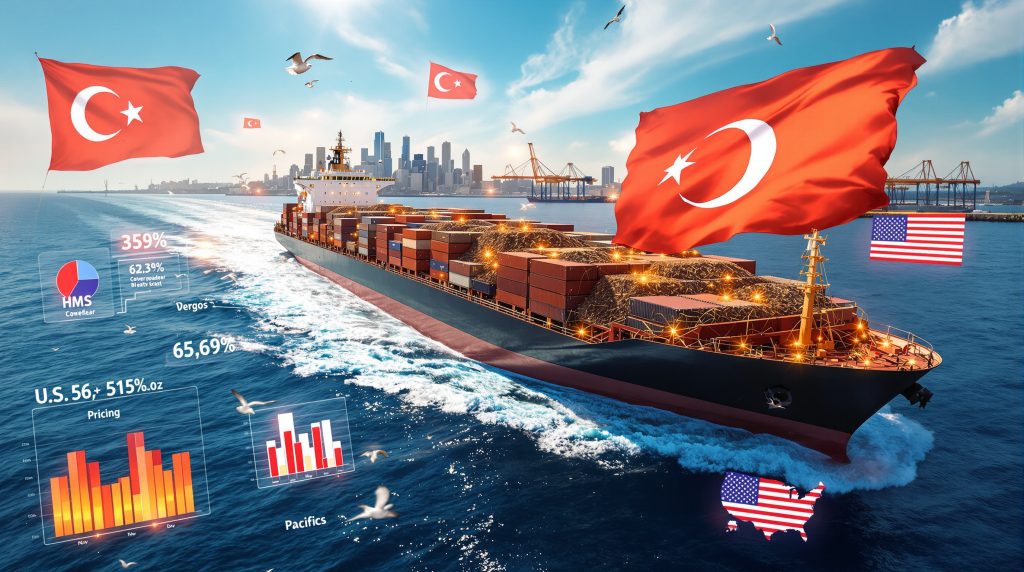Understanding the Global Scrap Metal Trade Anomaly
The ferrous scrap trade between America's Pacific Coast and Turkish steel mills represents one of the most infrequent commercial routes in global metals commerce. When uswc sells rare bulk scrap cargo to turkey, as occurred with a 50,000 metric tonne mixed-composition cargo that departed from Vancouver, Washington bound for Turkey in November 2025, industry observers took notice of this exceptionally rare transaction.
Unlike East Coast exporters who maintain established trading relationships with Mediterranean buyers, Pacific Northwest suppliers face substantial logistical and economic barriers that make Turkish sales extraordinarily uncommon. This particular shipment highlighted both the challenging market conditions facing West Coast exporters and the unique arbitrage opportunities that occasionally emerge in global scrap markets.
Geographic and Economic Barriers to Trans-Pacific Trade
Distance and Freight Economics
Shipping distances from major Pacific ports to Turkish facilities exceed 11,000 nautical miles, requiring voyage durations of 25-30 days compared to just 10-14 days from US East Coast origins. This extended transit time translates directly into higher freight costs, typically adding $40-60 per tonne to delivered prices and severely eroding profit margins for exporters.
The freight penalty becomes particularly significant when compared to traditional West Coast destinations. Asian markets like Bangladesh, India, and Vietnam offer much shorter shipping distances and established infrastructure for handling American scrap volumes. Furthermore, these tariffs impact insights demonstrate how trade barriers can affect global commodity flows.
Regional Market Dynamics
West Coast exporters have traditionally focused their efforts on Asian markets, building trading relationships with South Asian steel mills that span decades. However, recent developments in global iron ore tariffs have begun affecting these established partnerships. These relationships benefit from:
• Currency alignment with Asian buyers offering more favorable payment terms
• Established logistics networks optimised for Asian destinations
• Cultural and time zone advantages facilitating business relationships
• Market knowledge and risk assessment capabilities developed over time
Market Disruption Creates Rare Arbitrage Window
Asian Market Constraints Drive Alternative Routes
The November 2025 transaction occurred during a perfect storm of market conditions that disrupted traditional Pacific Coast export patterns. Asian markets experienced significant challenges that reduced their typical demand for American scrap metal. In addition, experts focusing on commodities volatility hedging noted these disruptions as key indicators of market instability.
| Market Factor | Impact on Exports | Timeline |
|---|---|---|
| Monsoon disruptions in Bangladesh/India | 60% reduction in seasonal demand | October-November 2025 |
| Indian domestic scrap preference policies | 40% decrease in deep-sea imports | Q3-Q4 2025 |
| Bangladeshi financing constraints | Limited cargo booking capacity | Ongoing through Q4 |
| Chinese steel export surge | Reduced Asian scrap import requirements | Throughout 2025 |
Prolonged monsoon rains through mid-October stalled the seasonal construction rebound in South Asia, directly impacting demand for scrap-intensive long steel products. Simultaneously, Bangladeshi buyers faced growing challenges financing large cargo purchases due to political uncertainty ahead of national elections.
Indian mills largely withdrew from the deep-sea market as government policies encouraged increased consumption of cheaper domestically sourced metallic units, further reducing traditional outlets for West Coast material. Consequently, these developments mirror the broader supply chain disruptions affecting global trade patterns.
Turkish Market Recovery Creates Premium Pricing
While Asian demand contracted, Turkey's ferrous scrap market experienced renewed strength driven by several factors:
• Rebar demand increased 15% month-over-month in October 2025
• Domestic Turkish scrap supply shortfalls created import opportunities
• Premium pricing for shredded material reached $20 per tonne above HMS grades
• Electric arc furnace utilisation rates improved significantly
The pricing differential became particularly attractive for West Coast exporters. Turkish mills consistently paid $20 per tonne premiums for shredded scrap compared to HMS 1/2 80:20 ratios, while South Asian buyers offered only $5 per tonne premiums for similar material grades.
Moreover, the complex dynamics of ferroalloys trade dynamics have contributed to shifting market preferences in the region.
Market Intelligence: The arbitrage window opened when Turkish shred pricing reached $375.50/tonne CFR compared to Bangladesh deals concluded slightly below $360/tonne CFR, creating sufficient margin to overcome the freight penalty.
Historical Trading Pattern Analysis
Decade-Long Transaction Frequency
Analysis of customs data reveals the exceptional rarity of West Coast-Turkey scrap transactions. Over the past ten years (2015-2025), only seven bulk cargoes have been shipped from Pacific ports to Turkish destinations, representing an average of less than one transaction annually.
The most recent prior transaction occurred in 2021, when 47,055 tonnes departed from Los Angeles bound for Turkish mills. This gap of nearly four years between transactions underscores the challenging economics of this trade route under normal market conditions.
According to recent data from Argus Media, such transactions remain exceptionally rare due to the economic barriers involved.
Historical Transaction Pattern (2015-2025)
| Year | Cargo Size (tonnes) | Departure Port | Vessel Configuration |
|---|---|---|---|
| 2025 | 50,000 | Vancouver, WA | Mixed HMS/Shred |
| 2021 | 47,055 | Los Angeles | Panamax vessel |
| 2019 | 45,200 | Vancouver, BC | Supramax vessel |
| 2017 | 42,800 | Seattle | Panamax vessel |
| 2016 | 44,500 | Los Angeles | Mixed grades |
Critical Cargo Size Requirements
Historical evidence reveals a clear pattern regarding minimum viable shipment sizes. Of the seven transactions completed over the decade, five exceeded 42,000 tonnes, suggesting this threshold represents the minimum economic cargo size required to overcome freight cost disadvantages.
Standard West Coast shipments to Asian destinations typically range around 32,000 tonnes, but Turkish-bound cargoes require significantly larger accumulations to achieve freight efficiency. This size requirement creates additional logistical challenges for exporters, who must coordinate larger inventory buildups and secure appropriate vessel capacity.
The vessel selection becomes crucial for these transactions. Panamax and Supramax vessels offer the economies of scale necessary to make long-distance voyages economically viable, but their availability and scheduling constraints add complexity to transaction planning. Furthermore, industry insights from Recycling Today highlight how Turkish mills are adapting to changing scrap supply patterns.
Structural Market Evolution and Future Implications
Changing Asian Demand Fundamentals
Several long-term structural shifts may increase the frequency of instances when uswc sells rare bulk scrap cargo to turkey in coming years:
Chinese Steel Production Impacts
China's surge in finished steel exports has reduced raw material import requirements across Asian markets. As Chinese mills export more finished products, regional competitors face reduced demand for scrap-intensive production, creating oversupply conditions in traditional West Coast destinations.
Infrastructure Development Cycles
Slowing construction activity in key Asian markets reflects maturing infrastructure development phases. Countries like India and Bangladesh are experiencing shifts from rapid expansion toward maintenance and replacement cycles, which typically require different steel product mixes and potentially less scrap-intensive production.
Domestic Supply Growth
Rising scrap generation within Asian markets reduces their dependence on imported material. As these economies mature and their steel consumption patterns evolve, domestic scrap availability increases, creating additional competition for American exporters.
Turkish Market Positioning Advantages
Turkey's position as a major scrap importer continues strengthening due to several factors:
• Annual scrap imports exceed 18 million tonnes, making it one of the world's largest importers
• Limited domestic scrap generation relative to steel production capacity creates structural import dependence
• Geographic positioning provides access to multiple supply sources, creating competitive pressure
• Electric arc furnace technology adoption favours high-quality scrap grades
Turkish steel producers' preference for premium scrap grades aligns well with typical West Coast material specifications. The emphasis on shredded material and low-contamination HMS grades matches the quality profiles that Pacific exporters can provide.
Investment and Strategic Trading Considerations
Market Timing and Arbitrage Recognition
Future West Coast-Turkey transactions will likely depend on specific market conditions creating sufficient arbitrage opportunities:
Price Differential Thresholds
Transactions become economically viable when Turkish scrap premiums exceed Asian prices by $15+ per tonne, providing adequate margin to cover the freight penalty. Currency fluctuations can significantly impact these calculations, particularly when dollar strength affects non-US buyer purchasing power.
Freight Rate Optimisation
Shipping market downturns that narrow freight rate differentials between short-haul Asian routes and long-haul Mediterranean destinations improve transaction viability. Market participants monitor Baltic Dry Index trends and vessel availability patterns to identify optimal shipping windows.
Supply Chain Infrastructure Requirements
Port Capacity Considerations
Successful large-scale transactions require deep-water berths capable of accommodating 45,000+ tonne vessels. Limited port infrastructure along the West Coast constrains the number of facilities capable of handling these specialised shipments efficiently.
Storage and accumulation capabilities become critical for building larger cargo sizes. Exporters must invest in or access expanded yard capacity to aggregate the volumes necessary for economic Turkish sales.
Quality Specification Alignment
Turkish mills' preferences for specific scrap compositions create both opportunities and constraints:
• High shred content preferred by electric arc furnace operations
• Consistent HMS 1/2 90:10 ratios meeting Turkish technical specifications
• Low copper and contamination levels aligning with environmental regulations
• Predictable chemical analysis supporting production planning
Risk Management and Market Dynamics
Disruption Events Favouring Trans-Pacific Trade
Several potential scenarios could increase the frequency of occasions when uswc sells rare bulk scrap cargo to turkey:
European Supply Constraints
Restrictions on European scrap exports or production disruptions could force Turkish mills to seek alternative sources, creating premium pricing opportunities for distant suppliers willing to accept longer logistics chains.
Black Sea Shipping Disruptions
Geopolitical tensions or infrastructure constraints affecting traditional supply routes could redirect Turkish purchasing toward more distant but secure supply sources, including North American exporters.
Asian Market Financing Difficulties
Banking restrictions or currency instability in traditional Asian destinations could create temporary but significant disruptions to established trade patterns, forcing West Coast exporters to explore alternative markets.
Long-Term Strategic Implications
Portfolio Diversification Benefits
West Coast exporters developing Turkish market capabilities gain valuable geographic diversification, reducing dependence on volatile Asian market conditions. This diversification can provide pricing leverage during negotiations with traditional buyers.
Quality Premium Capture
Turkish mills' willingness to pay premiums for high-quality American scrap creates opportunities for exporters to capture additional value from their material streams, particularly for shredded grades that command significant premiums in Mediterranean markets.
The November 2025 transaction represents more than an isolated market opportunity. It demonstrates how global supply chain disruptions can create unexpected arbitrage windows, while highlighting the infrastructure and market knowledge requirements necessary to capitalise on these rare but potentially profitable trading opportunities.
Market participants monitoring similar disruption patterns may find increasing opportunities to execute similar transactions as global scrap trade patterns continue evolving in response to changing industrial demand, regulatory pressures, and geopolitical considerations affecting traditional supply chains. For instance, each time uswc sells rare bulk scrap cargo to turkey, it provides valuable market intelligence for future trading decisions.
Note: This analysis is based on market observations and industry data available through November 2025. Future market conditions may vary significantly from historical patterns discussed, and readers should conduct independent research before making investment or trading decisions.
Ready to Capitalise on Rare Commodity Trading Opportunities?
Discovery Alert's proprietary Discovery IQ model delivers real-time alerts on significant mineral discoveries and emerging market opportunities across the Australian Stock Exchange, helping investors identify actionable trading positions before broader market recognition. Whether tracking infrastructure metals demand or monitoring supply chain disruptions that create arbitrage opportunities, subscribers gain critical market intelligence for both short-term trades and long-term investment strategies.




